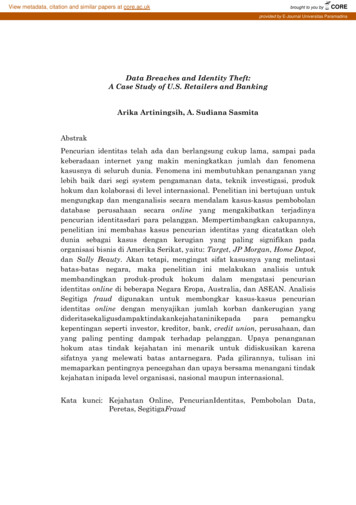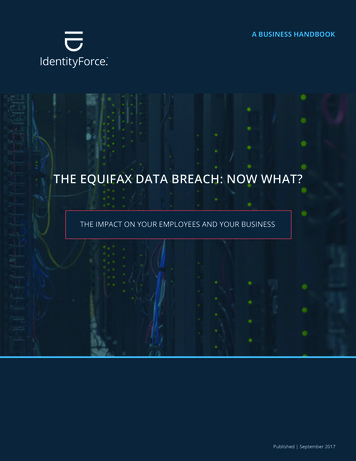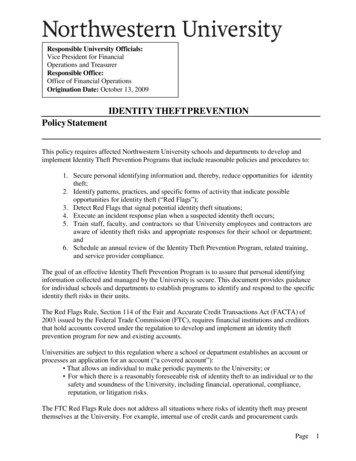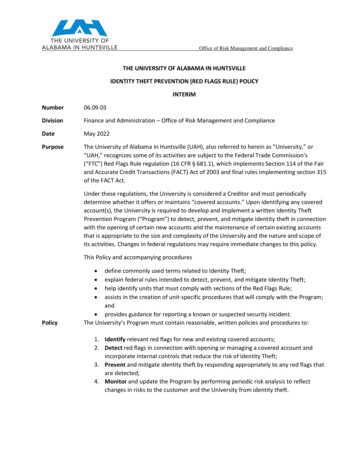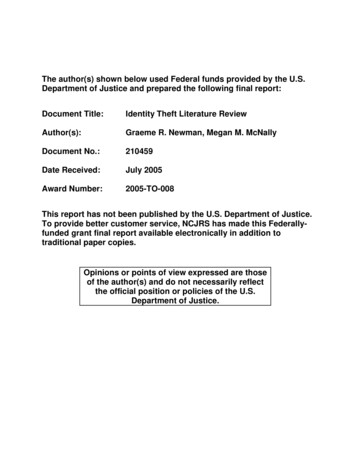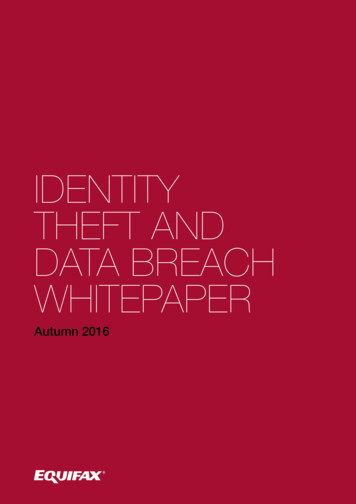
Transcription
IDENTITYTHEFT ANDDATA BREACHWHITEPAPERAutumn 2016
ContentsThe growing issue of identity theft and fraud03Demographics04Executive summary05Personal identity fraud06Company data breaches07Taking a closer look – the results in detail09Consumer concerns09Consumers’ expectations of companies12Conclusion14React swiftly with Equifax Protect15All figures, unless otherwise stated, are from YouGov Plc.1 /709-cyber-crime-assessment-2016/filew2 roup/3T otal sample size for questions regarding company data breaches was 2037 adults. Fieldwork was undertakenbetween 17th-20th June 2016. The survey was carried out online. The figures have been weighted and arerepresentative of all GB adults (aged 18 ). Total sample size for questions regarding personal identity theftconcerns and online protection such as multiple passwords was 2060 adults.Fieldwork was undertaken between 6th – 7th June 2016. The survey was carried out online.The figures have been weighted and are representative of all GB adults (aged 18 ).4C ifas 2016 Fraudscape Report5 f-you-dont-keep-data-safe-ico-warns/6E xcluding 25th/26th December
IDENTITY THEFT AND DATA BREACH WHITEPAPERThe growing issue ofidentity theft and fraudWith the financial gains possible, it is unsurprisingthat fraudsters continually find new ways to get holdof consumers’ personal information. Yet, worryingly,consumers’ awareness of scams and how toprotect themselves, particularly online, is still low.Making the problem worse – and the fraudsters’ ride easier – is that thereare still too many examples of companies that hold consumer data not doingenough to protect the information they have. This not only puts the consumerat risk of becoming a victim of identity fraud, but also threatens the reputationof the company. Even long standing loyal customers could lose faith and seekalternative providers for their goods and services.A recent report from the National Crime Agency (NCA)1 observed thatlaw enforcement bodies were losing the ‘cyber arms race’ with criminals.It highlighted a need for a stronger partnership between authorities andbusinesses to better fight online crime.And it’s not just private companies risking the safety of consumers’ identities.The public sector is equally vulnerable. For example, in June 2016 a breach ofthe South Yorkshire Police Force’s website potentially put confidential data atrisk. The hackers did state that they had only uploaded a false home page to runimages, videos and text relating to the Euro 2016 football tournament. But thepotential for further damage was extensive.2To assess what consumers understand about identity theft and fraud and theactions they take to protect themselves, as well as find out how consumers feelabout companies that experience data breaches, Equifax commissioned YouGovto undertake an in-depth study.The study comprised two detailed consumer surveys, one focusing on companydata breaches and the other on how consumers protect themselves againstidentity fraud, and how much of an issue they believe it to be.3equifax.co.uk3
IDENTITY THEFT AND DATA BREACH WHITEPAPERDemographicsOver 2,000 consumers took part in each online survey. All areas of England,Wales and Scotland were represented.Respondent breakdown for company data breaches survey60%% of onEastAgeMidlandsNorth55 45-5435-4425-3418-24FemaleMaleGenderRegionAudience breakdownMaleFemale18-2425-34 identity35-4445-54Respondentbreakdownfor personalfraud concernsMidlandsEastLondonSouthWalesandNorthonline protectionsurvey55 Scotland60%% of onEastAgeMidlandsNorth55 45-5435-4425-3418-24FemaleMaleGenderRegionAudience don35-44South45-54Walesequifax.co.uk55 Scotland
IDENTITY THEFT AND DATA BREACH WHITEPAPERExecutive summary:the expert viewMore than half of consumers surveyed claimed they are worried about identityfraud and account takeover. But with CIFAS, the fraud prevention organisation,reporting a 16% annual increase in fraud4, it is clear that more consumerawareness is essential to tackle to the growing problem. Encouragingly, 88%of respondents within the Equifax research did agree that sharing personalinformation on social media sites increased their risk of falling victim toidentity fraud, but again this should be even higher to ensure consumersare protecting themselves.“.whilst consumersare doing little to protectthemselves, they havehigh expectationsof companies.”High expectationsHowever, when it comes to companies that hold their personal data, consumersare less relaxed. Most would not use a company for the first time if they knewthey had previously experienced a data breach, and 61% would expect financialcompensation if their details were misused as a result of a data breach. It appears,therefore, that although consumers are doing little to protect themselves,they have high expectations of companies and rely on them to look after theirinformation securely and protect them from fraud.Of course, it is not just consumers who expect companies to look after theirdata and act quickly if anything compromises their privacy. The InformationCommissioner’s Office (ICO) demands the same. Companies of every size havelegal obligations under the Data Protection Act to look after any data they hold,and can expect fines if they don’t act appropriately to keep the data secure.In January 2016, the Information Commissioner at the time, Christopher Graham,reminded companies that their reputations are at risk if they do not keepconsumer data safe:“Companies that play fast and loose with people’s personal information risk thewrath of the ICO and that means fines of up to 500,000. A heavy fine is badenough, but the time, energy and money it takes to rebuild customer confidencecan be as severe a punishment as the fine itself.“ people care about what happens to their personal information. Getting it rightis not only an obligation under law, but it should be central to an organisation’sreputation management.” 5equifax.co.uk5
IDENTITY THEFT AND DATA BREACH WHITEPAPEROver half concerned about account takeover fraud55% of GB adults who responded to the survey are worried about identity theft– defined as the act of obtaining the personal or financial information of a realperson with the intent of assuming their identity.56% stated that they are worried about identity fraud – the act of using a stolenor fictitious identity to make applications for new financial products, servicesor bank accounts. The biggest worry, with 57% of GB adults concerned,is account takeover fraud – that is having sufficient information to be able touse real account details to purchase products and services. Figures from CIFASfor 2015 report a 49% increase in this type of fraud from the previous year,with 86% of identity fraud committed online.Worryingly, 7% of respondents have at some point in the past provided personalinformation to a company or individual over the phone, via email or through a websitewithout initiating the contact.10% of consumers are very diligent in protecting themselves against websitebreaches, by changing their online passwords at least once a month. However,27% change their passwords less often than once a year, and 23% admitted tonever changing their passwords unless specifically prompted by the website.Approximately how often, if at all, do you change ANY of youronline passwords without being asked or prompted to do so?1% 1% 2%12%5%At least oncea weekOnce a month11%Once a fortnightOnce a monthOnce every2 to 3 months23%11%Once every6 monthsOnce a year7%Less often thanonce a yearNeverPrefer not to say27%6equifax.co.uk
IDENTITY THEFT AND DATA BREACH WHITEPAPERWhen it is possible for fraudsters to obtain online passwords through simplephishing scams, these high figures represent easy access to tens of thousandsof online accounts.Company data breachesAlmost three quarters (73%) of GB adults think that companies should tellthem that they have experienced a data breach, and 63% of respondentswould expect that notification to come within hours. A further 21% would expectto hear on the same day. To meet these high expectations, companies mustensure they have processes in place to manage such a crisis efficientlyand effectively.Which, if any, of the following do you think the company shouldto do for you as a result of a data breach?Tell me that they have experienceda data breachSet up a new account for me so mypersonal information could not bemisused (e.g. set up a new accountnumber, unique ID number etc.)Set up a free monitoring serviceto provide an alert if my personalinformation is misusedProvide financial compensation ifpersonal information is misusedFlag my details with UK financialcompanies so if they are approachedwith my information, they can takeextra steps to check it is not misusedOtherDon’t know0%10%20%30%40%50%60%70%80%% of respondentsequifax.co.uk7
IDENTITY THEFT AND DATA BREACH WHITEPAPERIf a company experienced a data breach, 61% of GB adults would be unlikelyto purchase goods or services from them if they had not previously beena customer. This clearly demonstrates the importance of data security forcompanies of all sizes – the potential loss of business could be catastrophic.In general how likely, if at all, do you think you would be to purchasegoods or services from this company in the future, if you were requiredto provide personal information?2%Very likely15%Fairly likely22%Not very likelyNot at all likelyDon’t know23%38%8equifax.co.uk
IDENTITY THEFT AND DATA BREACH WHITEPAPERTaking a closer look:the results in detailThe generational differencesThere is a clear difference in the attitudes of different age groups, regardingthe sharing of personal information on social media websites. The youngestgroup, 18-24, a large proportion of whom will have grown up with access to theinternet and using social media sites daily, appear to be more relaxed. Just 40%believe sharing personal info on their pages could present a risk of identity fraud.However 60% of the 55 and over group felt this was a risk.Regionally, those living in the Midlands and Scotland are the most wary ofsharing details on social networks, with 55% and 56% respectively, stronglyagreeing that this posed a risk.Consumer concernsIn terms of consumer concerns about identity fraud, theft and account takeover,the same applies. The 18-24s appear far less concerned – 36% worry aboutidentity theft, 41% about identity fraud and 42% about account takeover.Contrasting with this are the 45-54 year olds, who are far more concerned –63% for identity theft, 64% for identity fraud and 62% for account takeover fraud.Women appear to be more concerned than men, with 17% vs 11% concernedabout identity theft and similar figures for the other types of fraud – 16% vs 11%for identity fraud and 13% vs 17% for account takeover fraud.People living in Wales appear to be consistently the most concerned region(18% identity theft and fraud, 17% account takeover), with Londoners mostworried about account takeover (18%) and those living in the South of Englandgenerally far less worried – 10% for both identity theft and fraud.Protecting themselvesRegularly changing passwords is crucial to make it harder for fraudsters to getinto people’s accounts. But it seems that although the 18-24 year olds are themost switched on to the online world, they are also the most lax and least likelyto change passwords regularly.equifax.co.uk9
IDENTITY THEFT AND DATA BREACH WHITEPAPERApproximately how often, if at all, do you change ANY of your onlinepasswords without being asked or prompted to do so?At least once a weekOnce a weekOnce a fortnightOnce a monthOnce every 2 to 3 monthsOnce every 6 monthsOnce a yearLess often than once a yearNeverPrefer not to say0%5%10%15%20%25%30%% of respondents18-2425-3435-4445-5455 There is little difference between men and women with 21% men and24% women never changing their passwords. So although women appearto be more concerned about identity theft and fraud, and account takeover,they are changing passwords less frequently.10equifax.co.uk35%
IDENTITY THEFT AND DATA BREACH WHITEPAPERApproximately how many unique passwords do you have for your onlineaccounts (e.g. email, online banking, social media websites etc.)?12345More than 5Don’t knowPrefer not to say0%5%10%15%20%25%30%35%40%45%% of respondents18-2425-3435-4445-5455 10% of 35-44 year olds and just 4% of 45-54 year olds have provided personalinformation to a company or individual over the phone, via email, or over the internetwithout machining the initial contact with the company. Therefore, they are providingtheir personal information without being sure of the initial source.equifax.co.uk11
IDENTITY THEFT AND DATA BREACH WHITEPAPERConsumers’ expectationsAlmost three quarters (73%) of GB adults online think that companies shouldtell them that they have experienced a data breach. Breaking this down by agegroup, we can see that the older generation is more demanding in terms ofcompanies being open about data breaches – 75% of over 55s, compared to67% of 18-24s felt a company should tell them about any breach.Nearly two thirds of all respondents (61%) believe that financial compensationshould be provided if personal information has been misused. But there is a splitbetween men and women, with men more expectant of financial compensation– 63% of men and 58% of women. The younger groups are again lessdemanding, with 53% of 18-24 compared to 64% of over 55s expecting toreceive financial compensation. The regional divide is also interesting, with 65%of those living in Southern England expecting compensation, compared to just55% of Scottish residents.Which, if any, of the following do you think the companyshould do for you as a result of a data breach?Tell me that they have experienceda data breachSet up a new account for me so mypersonal information could not bemisused (e.g. set up a new accountnumber, unique ID number etc.)Set up a free monitoring serviceto provide an alert if my personalinformation is misusedProvide financial compensation ifpersonal information is misusedFlag my details with UK financialcompanies so if they are approachedwith my information, they can takeextra steps to check it is not misusedOtherDon’t know0%10%20%30%40%50%60%70%% of .co.uk55 80%
IDENTITY THEFT AND DATA BREACH WHITEPAPERApproximately when would you expect the company to FIRST contactyou after they learned they had experienced a data breach?Within a few hoursWithin one dayWithin two daysWithin three to five daysWithin a weekWithin a monthLonger than a monthDon’t know0%10%20%30%40%50%60%70%80%% of respondentsMaleFemale18-2425-3435-4445-5455 63% would expect to be notified of a breach within hours, with expectationsvarying dramatically across the age groups – from less than half of young people(49% of 18-24 year olds) increasing with age, up to 74% of over 55s.61% of GB adults online would be unlikely to purchase goods or services from a UKcompany that had experienced a data breach, if they were not already a customer.Younger generations and men are more forgiving, with just over half (53%) of 18-34year olds, and 57% of men unlikely to use a company which has experienced abreach, compared to 72% of over 55s and 64% of women.equifax.co.uk13
IDENTITY THEFT AND DATA BREACH WHITEPAPERConclusionConsumers and companies both need to step upThe results of this in-depth study clearly show that there is some way to go forconsumers in terms of learning to protect themselves, their identity and financialinformation – particularly online. It seems that consumers are generally trusting.Young people are being the most relaxed and therefore probably the most atrisk, due to the fact that so many will have grown up with the internet, whetherat home or school, unlike the older age groups.The research also gives a clear picture for companies of how consumers expecttheir data to be handled, and how any data breach should be managed interms of informing customers. As such, the findings provide a huge incentivefor companies of all shapes and sizes to tighten their data protection processesin order to avoid losing significant proportions of customers and prospects dueto the loss of reputation which would follow a data breach. It is clear from theresearch that organisations need robust plans in place to meet these customerexpectations.Protecting personal information is the responsibility of both the consumer andany company acting as custodian of consumer data. One cannot be fullyeffective without the other playing its part.Fraudsters are continually evolving their methods, and whilst organisationstracking and stopping them do have high success rates, the financial incentivefor fraudsters to invent new techniques means they often stay one step aheadof those out to stop them.It is vital, therefore, that consumers and businesses do all they can to preventfraudulent access to personal information, and that their job is not made easy bycareless sharing of personal details on social media pages or elsewhere onlineor over the phone.As our lives move online more and more, the amount of data available is growingexponentially, and the opportunities for those looking to misuse the informationfor personal gain grow with it. This of course increases the appeal of online fraud.We are, therefore, likely to see the fraud figures continue to rise over the comingyears, unless both companies and individuals take responsibility and putinto place the necessary measures to stop fraudsters gaining access to thisvaluable information.14equifax.co.uk
IDENTITY THEFT AND DATA BREACH WHITEPAPERReact swiftly withEquifax ProtectEquifax is ideally placed to help businesses if they experience a data breach.We have one of the largest sources of detailed consumer data in the UK.Equifax Protect enables businesses to offer their customers and employees arange of tools so that they can react fast and take appropriate action to reducethe risk of fraud.The benefits of Equifax ProtectDETAILED INFORMATION TO SPOTFRAUDULENT CREDIT ACCOUNTSWe give individuals unlimited access to theirEquifax Credit Report & Score, allowing themto take action if they see suspicious activity.Information includes: Credit agreements including balances Searches for new credit applicationsALERTS TO RESPOND TONEW THREATS, QUICKLYWe’ll notify individuals of changes and newinformation we find enabling them to takemeasures against potential fraud: Automatic alerts of new credit accounts,credit searches performed and other keychanges to their Equifax Credit Report Linked addresses that may not be theircurrent home Optional monitoring of websites wherepersonal information is known to beexchanged and traded by fraudstersUNDERSTAND AND TAKE ACTIONAGAINST SOCIAL MEDIA RISKSRAPID DEPLOYMENT,COMPREHENSIVE SUPPORTWhile social media sites can be a greatway to connect with others, they’re alsoan opportunity for identity thieves to gatherpersonal data.We know responding fast is essential. Ourservice can be set up within three businessdays and includes template communicationsto help you contact affected customers oremployees with the right message.Equifax Social Scan enables individualsto search around 100 social media sitesfor public information about themselves,understand the fraud risk associated with itand where to take action.For end-users we provide support 7 days aweek6 by phone, online help and FAQs, withvictims of fraud specialists on hand shouldthe individual need them.equifax.co.uk15
IDENTITY THEFT AND DATA BREACH WHITEPAPERI2/v2/10-16A GLOBAL LEADER IN INFORMATIONEquifax Ltd is part of Equifax Inc., one of the world’sleading credit referencing agencies. Founded in1899 in Atlanta, Georgia, today Equifax Inc. operatesglobally, with bases or investments in 21 countries.Businesses throughout the world trust Equifax tohelp them reduce fraud and manage their credit risk.Equifax manages data on more than 800 millionconsumers and 88 million businesses worldwide.Find out more today. Talk to one of our data breach teamon 0800 085 4156 or email ukbreach@equifax.comEquifax Limited is registered in England with Registered No. 2425920.Registered Office: 1 Angel Court, London, EC2R 7HJ.Equifax Limited is authorised and regulated by the Financial Conduct Authority.16equifax.co.uk
identity theft, 41% about identity fraud and 42% about account takeover. Contrasting with this are the 45-54 year olds, who are far more concerned - 63% for identity theft, 64% for identity fraud and 62% for account takeover fraud. Women appear to be more concerned than men, with 17% vs 11% concerned


